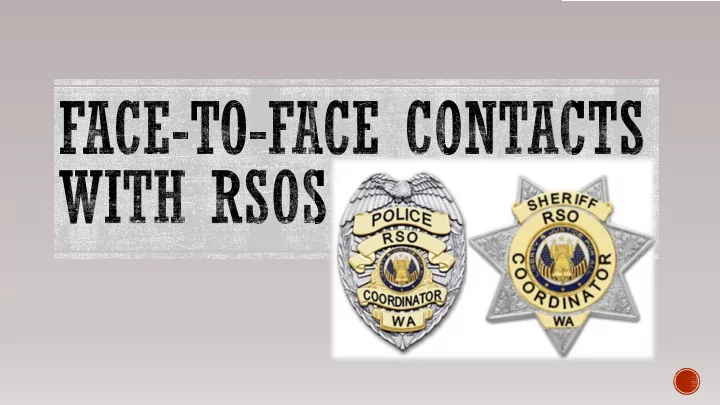

To provide you with a comprehensive overview on conducting effective face-to face contacts with RSOs, to include: How to prepare for face-to-face verification checks; What to look for while conducting the face-to-face contacts; Effective communication and the importance of gaining rapport with the RSO.
An essential role of the Registered Sex Offender (RSO) Coordinator is conducting RSO address verification checks. Face-to-Face contacts are the most effective method to conduct these checks. Law Enforcement agencies participating in the Registered Sex Offender Address and Residency Verification Program are required to conduct face-to-face address verification once a year for level I registered sex and kidnapping offenders; semi-annually for level II offenders; and quarterly for level III offenders.
Prep Contact Rapport
Preparation prior to Face to Face Contacts is a must!!
Good Communicator Patient Able to control their emotions/feelings about RSOs
ONCE SELECTED Train them Use the same officers
Computer check on the RSO for: Any orders Warrants Officer safety alerts Check for any conditions of release (Cannot be in places near children, not possess computers etc..) Verify the RSO is still living at the address listed on the OW form prior to your check
Review the RSOs OW Verification form Are there any comments in the ACTIVE OFFICER ALERT box (Officer safety alert, New photo required, DNA required) Items missing from OW form-Vehicle information, phone numbers, etc.
Have necessary equipment: Verification forms Camera Statement forms DNA kits Extra pens
Plain clothes/unmarked vehicle Check surroundings (Anything violating their conditions (living with children, possession of computers/cell phone) Update information (Phones, vehicles, workplace, school etc..)
Watch background-no family photos and especially no house numbers!!
TAKE THE TIME TO GAIN RAPPORT WITH THE RSO!! This rapport is a two-fold: Allows for smoother future contacts with the RSO Stability of an offender can prevent future victimization.
Stability of an offender can prevent future victimization. Harassment of offenders may increase risk to the community: • Offenders may go “underground” so law enforcement will not be able to monitor them • Offenders may feel out of control or targeted and re-offend • Offenders may stop treatment
Active Listening Skills
Emotions Labeling Paraphrasing Mirroring/ Reflecting Summary Open Ended Questions Minimal Encourages Effective Pauses “I” Messages
Statement of emotions heard Subjects often times will have multiple emotions. Identifying the underlying feelings and give it back to them. “you sound angry…” “You seem hurt…” “ I hear loneliness…” “You sound betrayed…abandoned.”
Extremely effective. Can build tremendous rapport by labeling emotions the subject is feeling. Easy to back off of: “ I did not say you were angry. I said you sound angry.” Never let a feeling go by without labeling. People love to have others understand how they feel.
Put meaning in what they are saying into your own words. Used for brief confirmations of meaning and to display attentiveness and interest. Subject: “She is always talking and doesn’t pay attention to what I say.” Officer: “She doesn’t listen to you.”
Brief follow alongs as the subject is talking. Voice inflection at the end can be used to demonstrate understanding or encourage them to go on. Subject:“I was wrongfully convicted and it makes me angry!” Officer:“It makes you angry.”
Periodically covering the main points His story + His feelings in your own words “okay, what you’ve told me so far is this…and as a result, you feel…Do I understand you correctly?”
Questions that require more than a “yes” or “no” response. “What…? “How…?” “When…?” “What happened today?” “How would you like this work out…?” Conveys a sincere interest in gaining understanding and limits the feeling of an interrogation.
Brief responses that lets the subject know you are paying attention to what they are saying. “uh-huh…really?”…Yeah….Ok etc. Best used when the person is talking through an extended thought or for an extended period of time. People want to know that you are there and listening.
Silence immediately before or after saying something meaningful. Helps focus thought and interaction. Helps show the subject that conversation is a turn taking process. People feel the need to fill in gaps of silence. Can also be an appropriate response to anger (waiting until the subject inquires if you are still there).
“When you…I feel…because…” Used to confront the subject about a behavior that is counterproductive, without being accusatory. “When you yell at me, I fell frustrated because it keeps me from listening to you.”
RSO Hicks – Suspect in an Indecent Liberties
RSO Tim – Child Pornography
Detective Allan O’Neill (425) 587-3502 aoneill@kirklandwa.gov
Recommend
More recommend